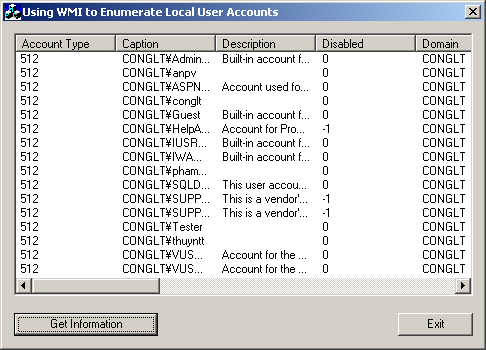
Introduction
Sometimes, you want to get information about user accounts in your computer. This article will help you get that information using WMI.
Supported Platforms
| Windows Server 2003
| Yes
|
| Windows XP
| Yes
|
| Windows 2000
| Yes, except for the property LocalAccount
|
| Windows NT 4.0
| Yes, except for the property LocalAccount, and with WMI installed.
|
| Windows 98
| Yes, except for the property LocalAccount, and with WMI installed
|
How to use it?
Step 1: Initialize COM:
CoInitialize(NULL);
Step 2: Set COM security levels:
if(CoInitializeSecurity( NULL,
-1,
NULL,
NULL,
RPC_C_AUTHN_LEVEL_PKT,
RPC_C_IMP_LEVEL_IMPERSONATE,
NULL,
EOAC_NONE,
0
) != S_OK)
return;
Step 3: Obtain the initial locator to WMI:
IWbemLocator * pIWbemLocator = NULL;
IWbemServices * pWbemServices = NULL;
IEnumWbemClassObject * pEnumObject = NULL;
BSTR bstrNamespace = (L"root\\cimv2");
if(CoCreateInstance (
CLSID_WbemAdministrativeLocator,
NULL ,
CLSCTX_INPROC_SERVER | CLSCTX_LOCAL_SERVER ,
IID_IUnknown ,
( void ** ) & pIWbemLocator
) != S_OK)
return;
Step 4: Connect to WMI through the IWbemLocator::ConnectServer method:
if(pIWbemLocator->ConnectServer(
bstrNamespace,
NULL,
NULL,
NULL,
0,
NULL,
NULL,
&pWbemServices
) != S_OK)
return;
Step 5: Use the IWbemServices pointer to make requests of WMI:
HRESULT hRes;
BSTR strQuery = (L"Select * from Win32_UserAccount") +
(L" Where LocalAccount = True");
BSTR strQL = (L"WQL");
hRes = pWbemServices->ExecQuery(strQL, strQuery,
WBEM_FLAG_RETURN_IMMEDIATELY, NULL, &pEnumObject);
if(hRes != S_OK)
{
MessageBox("Could not execute Query");
return;
}
Step 6: Get data from the query in step 5.
ULONG uCount = 1, uReturned;
IWbemClassObject * pClassObject = NULL;
hRes = pEnumObject->Reset();
if(hRes != S_OK)
{
MessageBox("Could not Enumerate");
return;
}
int nItemIndex = 0;
while (1)
{
hRes = pEnumObject->Next(WBEM_INFINITE, uCount,
&pClassObject, &uReturned);
if(hRes != S_OK)
{
break;
}
for (int i = enmAccountType; i < enmTotal; i ++)
{
VARIANT v;
BSTR strClassProp = SysAllocString(arrStrFields[i]);
hRes = pClassObject->Get(strClassProp, 0, &v, 0, 0);
SysFreeString(strClassProp);
_bstr_t bstrPath = &v;
char* strPath=(char*)bstrPath;
if (SUCCEEDED(hRes))
{
if (i == enmAccountType)
{
m_lstUsers.InsertItem(nItemIndex, strPath);
}
else
{
m_lstUsers.SetItemText(nItemIndex, i, strPath);
}
}
VariantClear( &v );
}
nItemIndex ++;
}
Step 7: Free memory.
pIWbemLocator->Release();
pWbemServices->Release();
pEnumObject->Release();
pClassObject->Release();
CoUninitialize();
Note
For more information about the Win32_UserAccount class used in this script, click here.
